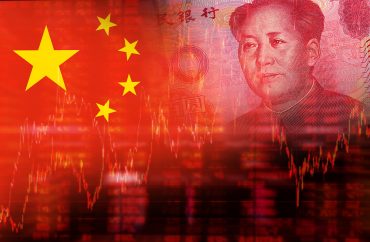
Chinese Tech Stocks Surge $350 Billion on AI Innovation Momentum
5 minute read

Chinese tech companies accelerate AI development and cloud revenue growth while trading at significant valuation discounts
Three Key Facts
- 6% EPS growth projected for 2025: UBS forecasts CSI 300 A-share earnings per share will increase year-over-year, assuming current U.S.-China tariffs remain unchanged.
- Chinese tech market cap surges $350 billion: The sector has gained substantial value since January 2025, driven by AI adoption and innovation confidence.
- Valuation discount reaches 13x forward P/E: Chinese tech companies trade significantly below U.S. tech peers at 20x or higher multiples, creating potential upside opportunities.
Introduction
Chinese technology companies face a pivotal moment as artificial intelligence drives recovery while macroeconomic headwinds persist. UBS anticipates gradual improvement in A-share earnings throughout the second half of 2025, with the tech sector leading growth momentum despite ongoing deflationary pressures.
The convergence of attractive valuations, AI-driven innovation, and supportive government policies creates a complex investment landscape. Chinese tech stocks trade at forward price-to-earnings multiples around 13-16x, substantially below global peers, while benefiting from accelerating cloud revenue and AI model deployment.
Key Developments
UBS analysts project modest quarterly rebounds in A-share earnings this year due to low comparative bases. The bank expects deflationary pressures to limit upward revisions to overall earnings estimates, keeping A-share valuations range-bound at low levels in the short term.
Chinese tech companies leverage artificial intelligence as a core growth engine, with AI models like DeepSeek R1 spurring increased inference workloads. This AI-driven focus positions the sector for recovery as cloud revenue acceleration becomes more visible in earnings reports.
Beijing’s industrial policy framework, including the “Made in China 2025” initiative, has increased government grants and tax benefits for strategic sectors. Tax incentives have grown at nearly 29% annually between 2018 and 2022, fostering innovation and research and development investments.
Market Impact
The Chinese tech sector’s market capitalization has increased by approximately $350 billion since January 2025, reflecting strong investor confidence in technological innovation and AI adoption. This substantial value creation demonstrates market recognition of the sector’s transformation potential.
Five categories of fund flows influence market dynamics in the second half of the year. These include Central Huijin’s investments in CSI 300 ETFs during corrections, medium-term funds favoring banks and high-dividend stocks, and retail investors propelling small-cap outperformance.
Capital market activity shows renewed vigor with major IPOs in related sectors like electric vehicle supply chains. This enhanced liquidity and investor access strengthens Hong Kong’s position as a tech listing hub while supporting overall sector sentiment.
Strategic Insights
China aims to achieve AI compute self-sufficiency, targeting an increase from 33% in 2024 to 90% by 2029. This ambitious goal creates a substantial localization opportunity estimated at $81 billion by 2029, driving investment in domestic AI infrastructure and semiconductor supply chains.
The research and development spending gap between U.S. and Chinese tech firms remains significant. U.S. cloud giants Microsoft, Amazon, and Alphabet are expected to spend approximately $180 billion on R&D in 2025, compared to $35 billion by China’s top cloud firms Alibaba, Tencent, and Baidu.
Medium-term valuations depend on trade negotiation outcomes between the U.S. and China, policy easing extent, and structural reform implementation. A de-escalation in trade tensions may benefit export-oriented sectors, while stronger policy stimuli could favor consumption and property.
Expert Opinions and Data
According to Investing.com, UBS analysts maintain a constructive view of the Chinese tech sector, emphasizing the improving risk-reward balance due to attractive valuations and strong earnings momentum. The bank recommends investors use market dips to increase exposure to quality Chinese tech names.
UBS highlights that if trade tensions and tariff risks continue to ease, the sector could achieve 12% or higher earnings growth in 2025-2026. This optimistic outlook reflects expectations that domestic stimulus and consumption growth will benefit internet and cloud companies.
The bank notes that Chinese tech companies remain discounted on a price/earnings-to-growth basis despite improving fundamentals. This valuation gap indicates potential upside for investors seeking portfolio diversification opportunities in emerging technology markets.
Conclusion
Chinese technology companies navigate a complex environment where AI innovation drives growth while macroeconomic uncertainties create valuation constraints. The sector’s substantial market cap gains and attractive valuations relative to global peers position it for continued investor attention.
Government support through industrial policies and tax incentives strengthens the foundation for long-term competitiveness, particularly in AI and semiconductor self-sufficiency. The convergence of supportive policies, renewed capital market activity, and technological advancement creates a framework for sustained sector development despite near-term volatility from trade uncertainties.








